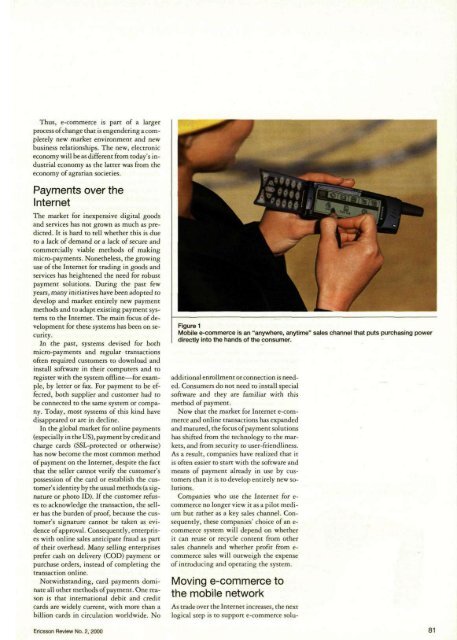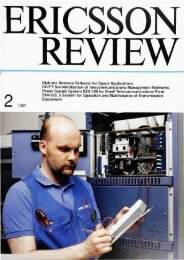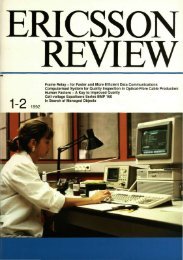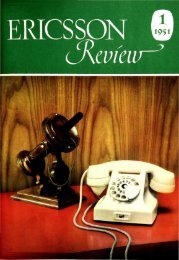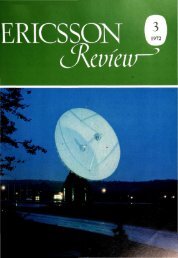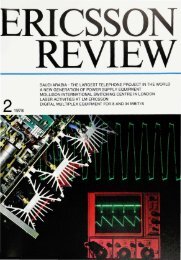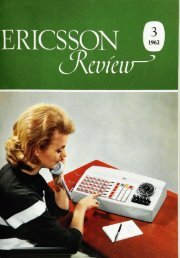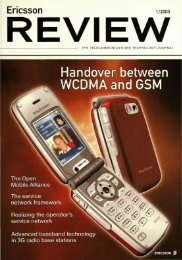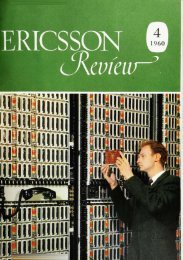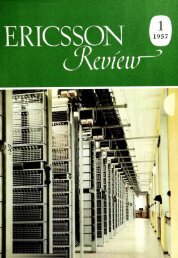Business solutions for mobile e-<strong>com</strong>merceOlle KallstromDemand is building for consumer-to-business mobile e-<strong>com</strong>merce thatwill enable consumers to use mobile phones to perform financial transactionsin a secure manner. Mobile e-<strong>com</strong>merce literally puts Internet-basedpurchasing power into the hands of consumers, allowing a degree of personalizationnever before seen. It opens up a new path to the market fortoday's content and service providers and enables the creation of anarray of services native to mobile <strong>com</strong>munications. In all likelihood, mobilee-<strong>com</strong>merce solutions will generate a variety of totally new applications inthe same way as the mobile Internet—which while an extension of fixedInternet has also given rise to <strong>com</strong>pletely new applications driven bymobility.The author describes the prerequisites for this market and the valueaddedsolutions that mobile telephony services can contribute to theworld of Internet e-<strong>com</strong>merce. He explains how end-users, serviceproviders, merchants, and network operators are likely to benefit frommobile e-<strong>com</strong>merce solutions—like Ericsson's Mobile e-Pay <strong>com</strong>binedwith other solutions—that will give rise to new services and businessopportunities.BOX A, ABBREVIATIONS3DESAPICADESGPRSGSMHMACHTTPIPIPPISPMACMD5MSISDNOA&MPINPKCSPKIRSASATSHA-1SIMSMSSMSCSSLTDMAWAPWIMWPKIWTLSTriple DESApplication program interfaceCertificate authorityDigital encryption standardGeneral packet radio serviceGlobal system for mobile <strong>com</strong>municationKeyed-hashing message authenticationcodeHypertext transfer protocolInternet protocolInternet payment providerInternet service providerMessage authentication codeMessage digest 5 (algorithm)Mobile station integrated servicesdigital numberOperation, administration and maintenancePersonal identification numberPublic key cryptographic standardPublic key infrastructureRivest-Shamir-AdlemanSIM application toolkitSecure hash algorithm 1Subscriber identity moduleShort message serviceSMS centerSecure socket layerTime-division multiple accessWireless application protocolWireless interface moduleWireless PKIWireless transport layer securityBoth the Internet and wireless systems areexpanding at a rapid pace. In the overlap ofthese growth areas, we find the mobile Internet.One of the most interesting businessopportunities here is mobile electronic <strong>com</strong>merce(e-<strong>com</strong>merce). In the emerging globaldigital economy, mobile e-<strong>com</strong>merce willprovide secure financial transaction servicesfor consumers anywhere, anytime. Initially,mobile e-<strong>com</strong>merce services will be adaptedfrom conventional Internet services extendedto mobile phones. Later, new serviceswill be based on the unique demands of mobileusers.The roots of e-<strong>com</strong>merceMany people regard e-<strong>com</strong>merce as buyingand selling products and services over theInternet, but it has many more aspects. Fromits inception, e-<strong>com</strong>merce consisted primarilyof purchase transactions and thetransfer of funds over <strong>com</strong>puter networks.Now it has grown to include the buying andselling of new <strong>com</strong>modities such as electronicinformation. Thus, the opportunitiesfor <strong>com</strong>panies seeking to take advantage ofthe capabilities of e-<strong>com</strong>merce are greaterthan those offered by merely moving ourpresent ways of performing <strong>com</strong>mercialtransactions to electronic networks.E-<strong>com</strong>merce has its roots in online transactionsbetween large corporations, banks,and other financial institutions. But small<strong>com</strong>panies are just as capable of conductingbusiness online as their biggest <strong>com</strong>petitors.Businesses of all sizes are finding that theycan lower their e-<strong>com</strong>merce costs, either byreplacing other networks with the Internet,by using it as another <strong>com</strong>municationsmedium, by converting their business datato digital form, or by incorporating Internetfunctions into their business practices.Whatever the case, the rapid growth in buyingand selling over the Internet by privateindividuals has only recently attracted theattention of the business <strong>com</strong>munity andmass media.Given the transportation systems oftoday, the world is the market for anyonewith a product—provided potential customersare aware of the product and have reliablemethods for ordering and paying forit. The Internet and e-<strong>com</strong>merce have finallygiven us the information technology systemsthat can interact with and exploit theglobal transport systems for deliveringproducts worldwide. The concepts time ofday and location have lost their importance;instead, online access and availability are thekey factors for success.A new business paradigm, spawned by theemerging global digital economy, promisesexplosive growth in electronic <strong>com</strong>merce onthe Internet. In a global market, <strong>com</strong>petitionis widespread. Those <strong>com</strong>panies thatcan cultivate the global marketplace byusing the Internet effectively will eventuallyemerge as winners. We see this today inportals like AOL and Yahoo, and sites likeAmazon and eBay.Electronic marketplacesThe explosion of e-<strong>com</strong>merce activity isleading to the creation of electronic marketplaces.These are made up of digital virtualbusinesses that band together in an openbut secure environment to interact witheach other and customers. On the Internettoday, we already see• virtual superstores;• electronic storefronts for existing services;• auctions and flea markets;• virtual order centers;• intranet-based electronic business <strong>com</strong>munities;and• virtual trading marketplaces.These new digital marketplaces have onething in <strong>com</strong>mon: they are closed in thesense that they are run by one <strong>com</strong>pany andinclude handpicked business partners orloyal online consumers who are found at asingle website. As the e-<strong>com</strong>merce businessmatures, new forms of the open electronicmarketplace will evolve, confirming the Internet'strue nature as a global marketplace.80 Ericsson Review No. 2, 2000
Thus, e-<strong>com</strong>merce is part of a largerprocess of change that is engendering a <strong>com</strong>pletelynew market environment and newbusiness relationships. The new, electroniceconomy will be as different from today's industrialeconomy as the latter was from theeconomy of agrarian societies.Payments over theInternetThe market for inexpensive digital goodsand services has not grown as much as predicted.It is hard to tell whether this is dueto a lack of demand or a lack of secure and<strong>com</strong>mercially viable methods of makingmicro-payments. Nonetheless, the growinguse of the Internet for trading in goods andservices has heightened the need for robustpayment solutions. During the past fewyears, many initiatives have been adopted todevelop and market entirely new paymentmethods and to adapt existing payment systemsto the Internet. The main focus of developmentfor these systems has been on security.In the past, systems devised for bothmicro-payments and regular transactionsoften required customers to download andinstall software in their <strong>com</strong>puters and toregister with the system offline—for example,by letter or fax. For payment to be effected,both supplier and customer had tobe connected to the same system or <strong>com</strong>pany.Today, most systems of this kind havedisappeared or are in decline.In the global market for online payments(especially in the US), payment by credit andcharge cards (SSL-protected or otherwise)has now be<strong>com</strong>e the most <strong>com</strong>mon methodof payment on the Internet, despite the factthat the seller cannot verify the customer'spossession of the card or establish the customer'sidentity by the usual methods (a signatureor photo ID). If the customer refusesto acknowledge the transaction, the sellerhas the burden of proof, because the customer'ssignature cannot be taken as evidenceof approval. Consequently, enterpriseswith online sales anticipate fraud as partof their overhead. Many selling enterprisesprefer cash on delivery (COD) payment orpurchase orders, instead of <strong>com</strong>pleting thetransaction online.Notwithstanding, card payments dominateall other methods of payment. One reasonis that international debit and creditcards are widely current, with more than abillion cards in circulation worldwide. NoFigure 1Mobile e-<strong>com</strong>merce is an "anywhere, anytime" sales channel that puts purchasing powerdirectly into the hands of the consumer.additional enrollment or connection is needed.Consumers do not need to install specialsoftware and they are familiar with thismethod of payment.Now that the market for Internet e-<strong>com</strong>merceand online transactions has expandedand matured, the focus of payment solutionshas shifted from the technology to the markets,and from security to user-friendliness.As a result, <strong>com</strong>panies have realized that itis often easier to start with the software andmeans of payment already in use by customersthan it is to develop entirely new solutions.Companies who use the Internet for e-<strong>com</strong>merce no longer view it as a pilot mediumbut rather as a key sales channel. Consequently,these <strong>com</strong>panies' choice of an e-<strong>com</strong>merce system will depend on whetherit can reuse or recycle content from othersales channels and whether profit from e-<strong>com</strong>merce sales will outweigh the expenseof introducing and operating the system.Moving e-<strong>com</strong>merce tothe mobile networkAs trade over the Internet increases, the nextlogical step is to support e-<strong>com</strong>merce solu-Ericsson Review No. 2, 2000 81


